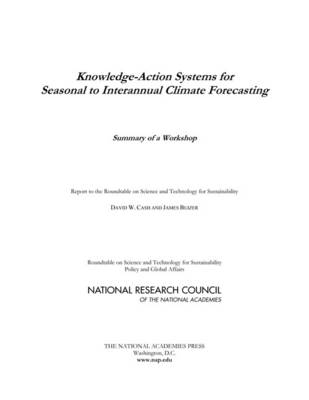
Knowledge-Action Systems for Seasonal to Interannual Climate Forecasting
Summary of a Workshop
Seiten
2005
National Academies Press (Verlag)
978-0-309-09272-2 (ISBN)
National Academies Press (Verlag)
978-0-309-09272-2 (ISBN)
Covers the workshop 'Knowledge-Action Systems for Seasonal to Interannual Climate Forecasting' held in 2004 to discover and distill general lessons about the design of effective systems for linking knowledge with action from the experience with the production and application of seasonal to interannual climate forecasts.
The National Academies' Roundtable on Science and Technology for Sustainability hosted a workshop "Knowledge–Action Systems for Seasonal to Interannual Climate Forecasting" in 2004 to discover and distill general lessons about the design of effective systems for linking knowledge with action from the last decade's experience with the production and application of seasonal to interannual climate forecasts. Workshop participants described lessons they had learned based on their experiences developing, applying, and using decision support systems in the United States, Columbia, Brazil, and Australia. Some of the key lessons discussed, as characterized by David Cash and James Buizer, were that effective knowledge–action systems: define and frame the problem to be addressed via collaboration between knowledge users and knowledge producers; tend to be end-to-end systems that link user needs to basic scientific findings and observations; are often anchored in "boundary organizations" that act as intermediaries between nodes in the system — most notably between scientists and decision makers; feature flexible processes and institutions to be responsive to what is learned; use funding strategies tailored to the dual public/private character of such systems; and require people who can work across disciplines, issue areas, and the knowledge–action interface. Table of Contents
Front Matter
1 Introduction
2 Case Material
3 Useful Framework for Understanding Forecasting Efforts
4 Components of Effective Systems
References
Appendix A: Acronyms
Appendix B: Workshop Agenda
Appendix C: Participants
The National Academies' Roundtable on Science and Technology for Sustainability hosted a workshop "Knowledge–Action Systems for Seasonal to Interannual Climate Forecasting" in 2004 to discover and distill general lessons about the design of effective systems for linking knowledge with action from the last decade's experience with the production and application of seasonal to interannual climate forecasts. Workshop participants described lessons they had learned based on their experiences developing, applying, and using decision support systems in the United States, Columbia, Brazil, and Australia. Some of the key lessons discussed, as characterized by David Cash and James Buizer, were that effective knowledge–action systems: define and frame the problem to be addressed via collaboration between knowledge users and knowledge producers; tend to be end-to-end systems that link user needs to basic scientific findings and observations; are often anchored in "boundary organizations" that act as intermediaries between nodes in the system — most notably between scientists and decision makers; feature flexible processes and institutions to be responsive to what is learned; use funding strategies tailored to the dual public/private character of such systems; and require people who can work across disciplines, issue areas, and the knowledge–action interface. Table of Contents
Front Matter
1 Introduction
2 Case Material
3 Useful Framework for Understanding Forecasting Efforts
4 Components of Effective Systems
References
Appendix A: Acronyms
Appendix B: Workshop Agenda
Appendix C: Participants
Roundtable on Science and Technology for Sustainability, National Research Council
1 Front Matter; 2 1 Introduction; 3 2 Case Material; 4 3 Useful Framework for Understanding Forecasting Efforts; 5 4 Components of Effective Systems; 6 References; 7 Appendix A: Acronyms; 8 Appendix B: Workshop Agenda; 9 Appendix C: Participants
| Erscheint lt. Verlag | 21.2.2005 |
|---|---|
| Verlagsort | Washington |
| Sprache | englisch |
| Maße | 216 x 279 mm |
| Themenwelt | Naturwissenschaften ► Geowissenschaften ► Geologie |
| ISBN-10 | 0-309-09272-8 / 0309092728 |
| ISBN-13 | 978-0-309-09272-2 / 9780309092722 |
| Zustand | Neuware |
| Haben Sie eine Frage zum Produkt? |
Mehr entdecken
aus dem Bereich
aus dem Bereich


